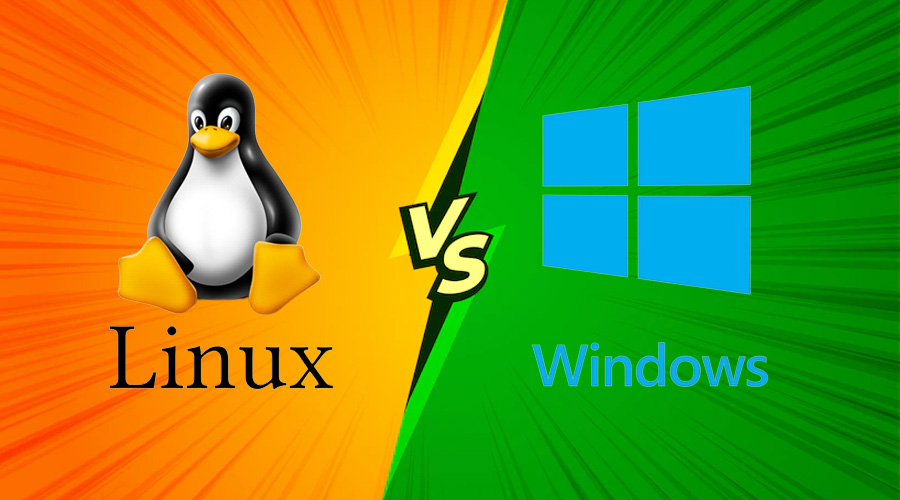In the world of computer operating systems, Windows and Linux are two of the most popular choices. Both have their own advantages and disadvantages, making it difficult to choose between them. With the right knowledge, however, you can make an informed decision about which one is best suited for your needs. In this article, we will explore the differences between Windows and Linux, highlighting their individual features and performance metrics. We will also discuss which OS is better suited for certain tasks or environments.
What is Linux?
Linux is an open-source operating system that was first created in 1991 by Linus Torvalds. It was designed to be a free and accessible alternative to proprietary operating systems such as Windows and macOS. Linux is based on the Unix operating system, which has been around since the 1970s.
One of the key aspects of Linux is its flexibility – users are able to modify and customize it according to their needs. This has made it popular among developers, who use it to create software applications for a wide range of uses. Linux is also known for its stability and security, with many experts considering it to be one of the most secure operating systems available.
Another advantage of Linux is that it can run on a wide variety of hardware platforms, from smartphones and tablets to servers and supercomputers.Interested in learning Linux Join and Learn more on Linux Training!
Why Linux?
Linux is one of the most popular operating systems in the world, and it has been gaining popularity since its inception. There are many reasons why people choose Linux over other operating systems such as Windows and Mac OS. Firstly, Linux is an open-source software, which means that anyone can download, use and modify it for free. This makes it a cost-effective option for individuals and businesses alike.
Secondly, Linux is known for its security features. Since it’s an open-source platform, developers from all around the world work together to identify vulnerabilities and fix them quickly. This ensures that users have access to the latest security updates to protect their data and privacy.
Another advantage of using Linux is its flexibility. The platform can be customized according to individual preferences, making it ideal for programmers who want to develop software or applications tailored to their specific needs.
What is Windows?
Windows is an operating system developed by Microsoft Corporation. It was first introduced in 1985 and has since become one of the most popular operating systems globally. It is a graphical user interface that allows users to interact with their computer using icons, windows, and menus. Windows offers several versions tailored to meet the needs of different types of users.
Windows has evolved over time, with each new version bringing added features and improvements to the user interface. The latest version of Windows is Windows 10, which was released in 2015. This version includes an improved start menu and taskbar, Cortana – a digital assistant, and several other features designed to make using your computer more efficient.
Overall, Windows has revolutionized the way we interact with computers by providing a platform that allows us to perform tasks easily through its intuitive user interface.
Why Windows?
For PC users, Windows is the go-to operating system. With over 1.5 billion active devices worldwide, Windows holds a dominant position in the desktop and laptop market. It’s not hard to see why so many people prefer it: Windows offers a range of features and benefits that make it stand out from other operating systems.
One of the key strengths of Windows is its versatility. Whether you’re using your computer for work or leisure, there’s a version of Windows that can meet your needs. From lightweight laptops running Windows 10 S to high-end gaming rigs powered by Windows 10 Pro, Microsoft has built an ecosystem that caters to different use cases and budgets.
Another advantage of choosing Windows is its compatibility with third-party software and hardware.
Linux Vs Windows
Linux and Windows are two popular operating systems with distinct differences in terms of their design, functionality, and intended use cases. Here are some key differences:
Cost: Linux is open-source and available for free, while Windows is a proprietary operating system that requires a license fee to use.
User interface: Windows has a user-friendly graphical interface, while Linux offers a wide range of graphical user interfaces (GUIs) that can vary in complexity and ease of use. Some Linux distributions also have a command-line interface that is more powerful and flexible than the Windows command prompt.
Compatibility: Windows has better compatibility with a wide range of software and hardware, while Linux can be more limited in terms of compatible software and drivers.
Security: Linux is known for its security and is less vulnerable to viruses and malware than Windows. Linux is also more customizable, which can help to reduce security risks.
Development: Linux is widely used in software development, as it provides a more open and customizable environment. Windows, on the other hand, is often used in enterprise environments that require compatibility with legacy software and applications.
Ultimately, the choice between Linux and Windows will depend on your specific needs and use cases. Linux is a good choice for those who prioritize security, customization, and open-source software, while Windows may be a better choice for those who need broad compatibility with software and hardware and a user-friendly interface.
Features of Linux and Windows
Here are some of the key features of Linux and Windows:
Linux:
- Open-source: Linux is open-source software, which means that its source code is freely available for anyone to use, modify, and distribute.
- Customizable: Linux is highly customizable, with a wide range of available distributions and the ability to customize the operating system to meet specific needs.
- Security: Linux is known for its security and stability, with fewer vulnerabilities and a lower risk of malware infections than Windows.
- Terminal: Linux has a powerful terminal that allows users to execute commands, scripts, and automate tasks.
- Software repositories: Linux has a centralized system for downloading and installing software through software repositories, which makes it easy to find and install new applications.
Windows:
- User-friendly interface: Windows has a user-friendly graphical interface that is easy to use and navigate.
- Compatibility: Windows has broad compatibility with a wide range of software and hardware, making it a popular choice for businesses and consumers.
- Gaming: Windows is the most popular operating system for gaming, with many popular games being released exclusively for Windows.
- Productivity tools: Windows comes with a wide range of productivity tools, including Microsoft Office, that are widely used in businesses and organizations.
- Support: Windows has a large user base and a robust support system, making it easy to find help and support when needed.
In conclusion,Linux and Windows are both viable options for a user looking for an operating system. They both offer diverse features and benefits, depending on the user’s needs. Windows provides a familiar interface that is easy to use, while Linux supports open-source software and offers more control over your computing environment. Ultimately, it is up to the individual to decide which operating system is best for them depending on their computing needs and skill level.





